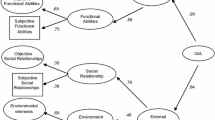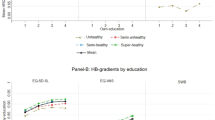Abstract
Introduction and methods
This study investigated the relationship between health-related quality of life (QoL), educational level and culture, using a high quality cross-cultural generic measure (WHOQOL-BREF) containing 25 international dimensions organised in physical, psychological, social and environmental domains.
Results
Cross-cultural data from 9,404 sick and well adults in 13 countries showed that environmental QoL increased positively and sequentially from no education to tertiary education. The other three domains increased only up to secondary school level. These MANCOVA results were significantly influenced by health status, age, culture and economic development level. More positive feelings, less dependence on medication and treatment, better perceptions of financial resources, physical environment, and opportunities for information and skills, represent adult QoL advantages to those who received tertiary education compared with secondary schooling. Developing countries reported poorer environmental, psychological and physical QoL than developed countries, although social QoL was good, and no different for the two development bands. Only psychological QoL distinguished between every educational level, in developing countries. Increased positive feelings serve to link better mental health with more education. Across each domain, secondary and tertiary education was associated with better QoL in developing countries.
Conclusion
The results support a QoL case for universal secondary education on which better health and health care may be built.
Similar content being viewed by others
References
Alonso J, Regidor E, Barrio G, Prieto L, Rodriguez C, de la Fuenta L (1998) Population-based reference values for the Spanish version of the Health Survey SF-36. Medicina Clinica 111(11):410–416
Berry JW, Poortinga YH, Segall MH, Dasen PR (1992) Cross-cultural psychology: research and applications. Cambridge University Press, Cambridge
Biswas-Diener R, Diener E (2001) Making the best of a bad situation: satisfaction in the slums of Calcutta. Soc Indic Res 55:329–352
Bowden A, Fox-Rushby J (2003) A systematic and critical review of the process of translation and adaptation of generic health-related quality of life measures in Africa, Asia, Eastern Europe, the Middle East, and South America. Soc Sci Med 57(7):1289–1306
Camfield L, Skevington SM (2008) On subjective well-being and quality of life. J Health Psychol 13:764–775
Department for International Development (DfID) (2001) The challenge of universal primary education: strategies for achieving the international development targets. Department of International Development, London
Diener E, Oishi S (2000) Money and happiness: income and subjective wellbeing across nations. In: Diener E, Suh EM (eds) Culture and subjective well-being. MIT Press, Cambridge, pp 185–218
Diener E, Oishi S, Lucas RE (2003) Personality, culture and subjective well-being: emotional and cognitive evaluations of life. Annu Rev Psychol 54:403–425
Fernandez-Ballesteros R, Zammarron MD, Ruiz MA (2001) The contribution of socio-demographic and psychosocial factors to life satisfaction. Ageing Soc 21:25–43
Galea S, Ahern J, Nandi A, Tracy M, Beard J, Vlahov D (2007) Urban neighbourhood poverty and the incidence of depression in a population-based cohort study. Ann Epidemiol 17(3):171–179
Gwatkin DR (2001) Poverty and inequalities in health within the developing countries: filling the information gap. In: Leon D, Walt G (eds) Poverty, inequality and health: an international perspective. Oxford University Press, Oxford, pp 217–246
Inglehart R, Foa R, Peterson C, Welzel C (2008) Development, freedom and rising happiness: a global perspective (1981–2007). Perspect Psychol Sci 3:264–285
Ingelhart R, Klingemann HD (2000) Genes, culture, democracy and happiness. In: Diener E, Suh EM (eds) Culture and subjective well-being. MIT Press, Cambridge, pp 165–184
Kahneman D (1999) Objective happiness. In: Kahneman D, Diener E, Schwartz N (eds) Well-being: the foundations of hedonic psychology. Russell Sage Foundation, New York, pp 3–25
Manly JJ (2006) Deconstructing race and ethnicity—implications for the measurement of health outcomes. Med Care 44(11):S10–S16
Myers DG (2000) The funds, friends and faith of happy people. Am Psychol 55:56–67
Nussbaum MC (2000) Women and human development: the capabilities approach. Cambridge University Press, Cambridge
Olusina AK, Ohaeri JU (2003) Subjective quality of life of recently discharged Nigerian psychiatric patients. Soc Psychiatry Psychiatr Epidemiol 38:707–714
Patel V (2001) Cultural factors and international epidemiology. Br Med Bull 57:33–45
Purcell K, Elias P, Davies R, Wilton N (2005) The class of ‘99—a study of the early labour market experience of recent graduates. DfES, Sheffield
Regidor E, Barrio G, de la Fuente L, Domingo A, Rodriguez C, Alonso J (1999) Association between educational level and health-related quality of life in Spanish adults. J Epidemiol Community Health 53:75–82
Sirgy J (2001) Handbook of QOL research: an ethical marketing perspective. Kluwer Academic Publishers: Social Indicators Research Series, Dordecht
Skevington SM (2002) Advancing cross-cultural research on quality of life: observations drawn from the WHOQOL development. Qual Life Res 11:135–144
Skevington SM, Lotfy M, O’Connell K, the WHOQOL Group (2004) The World Health Organisation’s WHOQOL-BREF quality of life assessment: psychometric properties and results of the international field trial. A report from the WHOQOL Group. Qual Life Res 13:299–310
Skevington SM, MacArthur P, Somerset M (1997) Developing items for the WHOQOL: a study of contemporary beliefs about quality of life related to health in Britain. Br J Health Psychol 2:55–72
Skevington SM, Sartorius N, Amir M, the WHOQOL Group (2004) Developing methods for assessing quality of life in different cultural settings: the history of the WHOQOL instruments. Soc Psychiatry Psychiatr Epidemiol 39:1–8
Skevington SM, Wright A (2001) Changes in the quality of life of patients receiving anti-depressant medication in primary care: validating the WHOQOL-100. Br J Psychiatry 178:261–267
Thumboo J, Fong K-Y, Machin D, Chan S-P, Soh C-H, Leong K-H, Feng P-H, Thio S-T, Boey M-L (2003) Quality of life in an Asian population: the impact of ethnicity and socio-economic status. Soc Sci Med 56:1761–1772
Triandis HC (2000) Cultural syndromes and subjective well-being. In: Diener E, Suh EM (eds) Culture and subjective well-being. MIT Press, Cambridge, pp 13–36
United Nations Development Program (1990) Human development report. Oxford University Press, Oxford
United Nations Development Program (2001) Human development report: concept and measurement of human development. Oxford University Press, Oxford
United Nations (2007) Millennium development goals report. UN, Geneva
Ware JE, Sherbourne DD et al (1992) The MOS 36-item short form health survey (SF-36): conceptual framework and items selection. Med Care 30:473–483
WHOQOL Group (1994) The development of the World Health Organisation’s quality of life assessment instrument (the WHOQOL). In: Orley J, Kuyken W (eds) Quality of life assessment: international perspectives. Springer, Berlin
WHOQOL Group (1995) The World Health Organization quality of life assessment (WHOQOL): position paper from the World Health Organization. Soc Sci Med 41:1403–1409
WHOQOL Group (1998) Development of the World Health Organization WHOQOL-BREF quality of life assessment. Psychol Med 28:551–558
World Bank (1991) World development report: the challenge of development. Oxford University Press, Oxford
World Health Organisation (1998) Health for all in the 21st century. WHO, Geneva
World Health Organisation (2008) Closing the gap in a generation: health inequality through action on the social determinants of health. World Health Organisation, Geneva. http://www.who.int/social_determinants/final_report
Acknowledgments
With grateful thanks to Norman Sartorius, David Clark, Laura Camfield, Ian Gough, and anonymous referees.
Author information
Authors and Affiliations
Corresponding author
Additional information
For the WHOQOL Group See Appendix.
Appendix
Appendix
Footnote on Authorship
The WHOQOL Group comprises a co-ordinating group of collaborating investigators in each of the field sites and a panel of consultants. Dr Rex Billington directed this project that was initiated by Dr John Orley and Dr Norman Sartorius. The work reported here was carried out in 24 of the field sites: Prof. H. Herrman, St Vincent’s Hospital, Australia; Dr S. Bonicatto, FUNDONAR, Argentina; Dr M. Fleck, University of the State of Rio Grande do Sul, Brazil; Dr V. Petkov, National Centre for Interdisciplinary Human Studies, Bulgaria; Prof. S. Szabo, Prof Z. Metelko and Mrs M Pibernik-Okanovic, University of Zagreb, Croatia; Professor M.C. Angermeyer and Dr R Kilian, Department of Psychiatry, University of Leipzig, Leipzig, Germany; Dr L. Kullmann, National Institute for Medical Rehabilitation, Hungary; Dr S. Kumar, Chennai Medical College, Madras, India; Dr S. Saxena and Dr Rachna Bhargava, All India Institute of Medical Sciences, New Delhi, India; Dr M. Amir, Ben-Gurion University of the Negev, Beer-Sheva, Israel; Dr G. de Girolamo, Instituto Superiore di Sanità, Rome, Italy; Dr M. Tazaki, Science University of Tokyo, Japan; Dr H. Che Ismail, University of Sains Malaysia, Kelantan, Malaysia; Dr M. Kalfoss, Oslo College, Norway; Dr A. Lomachenkov, V.M. Bekhterev Psychoneurological Research Institute, St Petersburg, Russian Federation; Dr R. Lucas Carrasco, Barcelona, Spain; Dr C. Fidaner, Izmir Cancer Registry Center, Turkey; Prof. S. Skevington and Dr K. O’Connell, University of Bath, Bath, United Kingdom; Prof. D. Patrick, Ms M. Martin and Dr D. Buesching, University of Washington, Seattle, United States. Some data was collected as part of the Longitudinal Investigation of Depression Outcomes (LIDO) study directed by Health Research Associates Inc., and in several field centres of the WHO Disability Assessment Schedule (WHODAS) validation study (ACE Group, WHO, Geneva). Further information on the WHOQOL can be obtained at http://www.who.ch\msa\mnh\mhp\ql.htm.
Rights and permissions
About this article
Cite this article
Skevington, S.M. Qualities of life, educational level and human development: an international investigation of health. Soc Psychiat Epidemiol 45, 999–1009 (2010). https://doi.org/10.1007/s00127-009-0138-x
Received:
Accepted:
Published:
Issue Date:
DOI: https://doi.org/10.1007/s00127-009-0138-x




